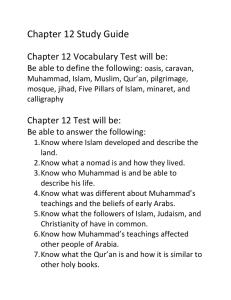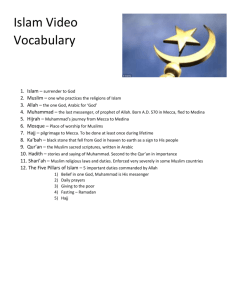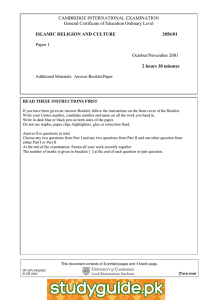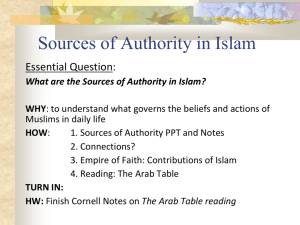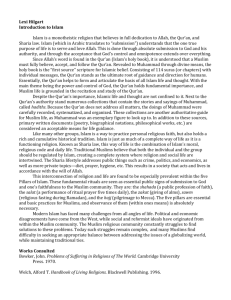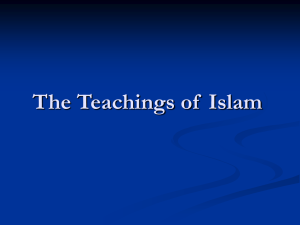Unit 3d: Foundational Beliefs--Islam Objectives Be aware of the following Identify
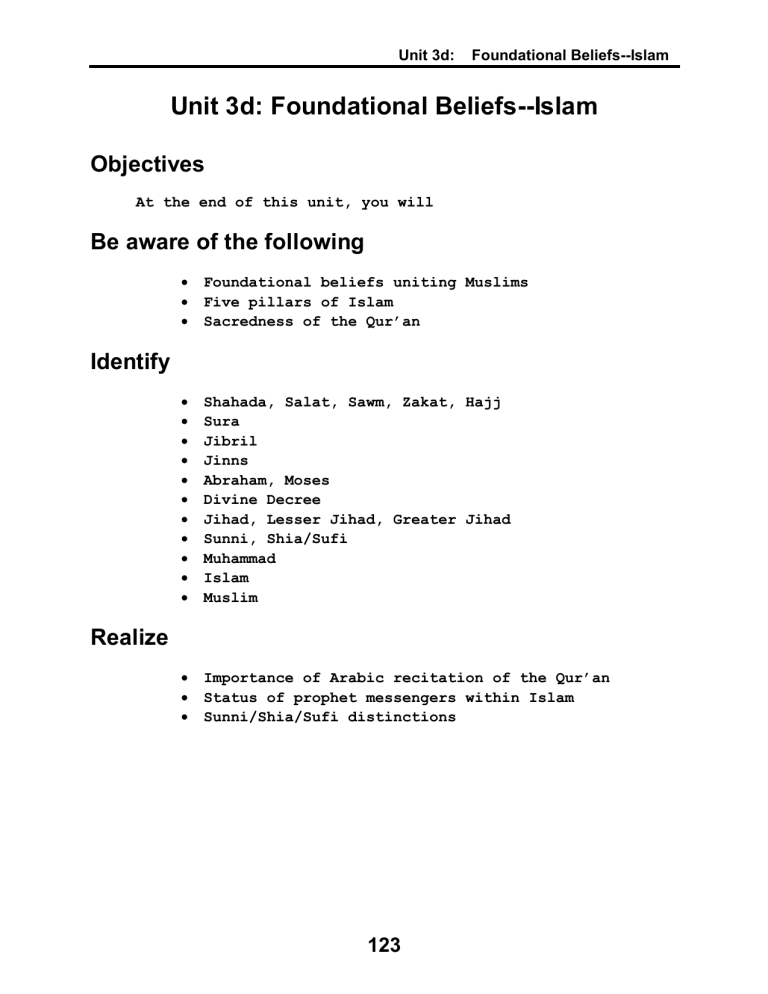
Unit 3d: Foundational Beliefs--Islam
Unit 3d: Foundational Beliefs--Islam
Objectives
At the end of this unit, you will
Be aware of the following
•
Foundational beliefs uniting Muslims
•
Five pillars of Islam
•
Sacredness of the Qur’an
Identify
•
Shahada, Salat, Sawm, Zakat, Hajj
•
Sura
•
Jibril
•
Jinns
•
Abraham, Moses
•
Divine Decree
•
Jihad, Lesser Jihad, Greater Jihad
•
Sunni, Shia/Sufi
•
Muhammad
•
Islam
•
Muslim
Realize
•
Importance of Arabic recitation of the Qur’an
•
Status of prophet messengers within Islam
•
Sunni/Shia/Sufi distinctions
123
Unit 3d: Foundational Beliefs--Islam
Foundational Beliefs--Islam
“...Islam [in much of Southeast Asia] is represented by syncretic practices and beliefs deviating from the sunna, arising out of persistent pre-Islamic folk-belief and [indigenous] practices, the residuum of Hinduism and Buddhism, the overlapping of
Sufi mysticism with indigenously-based Gnostic survivals, and other variants from...sanctioned ritual and behavior .”
--The Political Impact of Islam in Southeast Asia, p. 5.
While Islam in East Asia includes elements of Sufi and indigenous folk religious practice, it nonetheless adheres to the following foundational beliefs.
1. The Five Pillars
Five foundational faith expressions unite all Muslims:
a. Shahada
(sha-HAHD-ah, witnessing) This is the essential creed of Muslim belief. It is repeatedly invoked as part of daily prayer. The shahada states:
‘There is no god but God and Muhammad is the messenger of God.’
When said with heartfelt intention before two official witnesses, this testimony initiates a person into the Islamic community.
b. Salat
(shul-LAHT, prayers)
Five times each day, Muslims pray in
Arabic. Salat consists mainly of verses from the Qur’an, praises to
God, and requests for guidance.
Adherents bow toward the Kaabah in
Mecca when praying.
124
Unit 3d: Foundational Beliefs--Islam
c. Sawm
(SOO-uhm, fasting) During the month of
Ramadan, thanksgiving is expressed, discipline shown, and communal solidarity and reconciliation affirmed.
Practitioners abstain from food, drink, smoking and sexual relations from dawn to sunset.
d. Zakat
(SA-kat, almsgiving) The faithful demonstrate tangible worship by giving a kind of “loan to God” of from two to ten percent of one’s income, payable at year’s end. Charitable causes receive support in more spontaneous manners, as needs arise.
e. Hajj
(al-HAHJ, pilgrimage)
At least once in a lifetime, during the twelfth month of the calendar, a Muslim takes a trip to Mecca. No one goes on Hajj without first ensuring that family members are provided for in their absence.
Financial and health concerns may also determine whether a person goes on Hajj. some seriously ill individuals who go on Hajj go with the realization that if they die in mecca, their souls will go directly to heaven.
2. Basic Beliefs
Essential Muslim beliefs cluster around the following headings.
a. God
The Qur’an narrates: “ God is One, the eternal God. He begot none, nor was he begotten. None is equal to Him.” ( Sura 112 [Sura ‘SOO ruh,’ being the chapter of the Qur'an].)
The “uncomplicated absoluteness of God” found in the Qur’an sets Islam apart from rival belief systems.
Life is a unified whole under the one God. No sacred/secular division occurs. Humankind is created in the image of God with His imprint upon the “very substance of their souls.”
125
Unit 3d: Foundational Beliefs--Islam
b. Angels
An active belief in angels permeates the Islamic world and life view. Jibril (jib-REEL,
Gabriel), who delivered the Qur’an, is the most important angel. Other invisible beings ( jinns ), who possess extraordinary powers, are capable of either good or evil.
c. Revealed Books
Moses, David, Jesus, and
Muhammad all transmitted literally the respective books dictated to them--the Torah, Psalms, Gospel and
Qur’an. While all are authoritative, the Qur’an--due to its accuracy of text, breadth of scope and manner of transmission--in practice is Islam’s primary book.
d. Qur’an
The Qur’an, the “text from on high,” is the word of God. “The [Qur’an] was the prime inspiration of a religious movement which gave rise to a civilization of wide extent, vast power and profound vitality. The literature and fine arts of all Muslim people spring from this fountain head...No man seeking to live in the same world as Islam can afford to regard lightly, or to judge ignorantly, the Book that is called The [Qur’an]. It is among the greatest monuments of humankind. It surely deserves and demands to be more widely known and better comprehended in the
West.” (Arberry, The Holy Qur’an as quoted in Cragg,
Readings in the Qur’an, p. 51.)
Everything about the Qur’an is sacred--its sounds, words, letters, even parchment and paper. Verses of the Qur’an are the first sounds a new child hears and the last a dying person listens to.
The art of chanting the Qur’an, the “supreme sacred act of Islam,” can move a Muslim to tears.
To capture the full beauty of the Qur’an, one must hear it recited in its original Arabic. Protestant scholar Kenneth Craig writes:
126
Unit 3d: Foundational Beliefs--Islam
“ Translations do not convey the emotion, the fervor, the mystery the
Qur’an holds in the original.
Reading the Book in the quiet of the study, perusing it with the eye, silences the force of the text which properly belongs with the ear and the soul...Recital can become for the believer a sacramental experience, as organs of speech, tongue, lips and vocal cord move with the vowels and consonants, as the Prophet’s did, of what faith holds to be divine, Arabic utterance .” (Readings in the
Qur’an, page 31.)
The Qur’an is a prophetic discourse, not written chronologically, meant to be consumed rather than subjected to scientific examination. Its style is of the powerful, expansive imaginary of Middle East culture. Obedience is its final goal.
“...the Qur’an is not finally a thing for admiration. Its rhetoric and its irony, its imagery and eloquence, are not ends in themselves. They are calculated to arouse, to convince, to warn and to educate...they demand not patronage but obedience .”
(Cragg, p. 51.)
“...like a pearl for which the diver must plunge to break the shell which both ensures and conceals the treasure...the Qur’an...yields itself only to those who rightly understand.” (Cragg, pp. 14, 16.)
Each of the 114 Suras begins “in the name of God, compassionate, all merciful.” The total text, divided into thirty parts, allows for daily readings/ recitations of one part for each day of the lunar month.
127
Unit 3d: Foundational Beliefs--Islam
As the Suras begin with the longest to the shortest, and the latter ones are more event/subject descriptive, new readers are advised to begin at the back and work their way forward.
e. Prophet-Messengers
The biblical figures, plus some unknown Arabian messengers, are seen as ambassadors (rusul--prophets with a specific mission who bring the word) of God. Muhammad (muh-HAHM-mad), the last of the prophets, is the only one who proclaims a universal message.
Abraham and Moses are the greatest of the Prophet-Messengers. The phrase
“peace be upon them” is often written after their names. Muhammad, though not divine, receives highest respect.
The phrase “prayer and peace be upon him” is often said or written after
Muhammad's name.
f. Last Things
Bodily resurrection, judgment, paradise and hell are the climax of history. Hell is not eternal for the believer, as Muhammad will intercede for those possessing even an “atom of faith.”
Millennial leaders ( Mahdi , MAH-dee) will defeat enemies of Islamic religion at the end of history, establishing peace and justice upon the earth.
g. Divine Decree
This belief that everything is decided by God and in some sense comes from Him, articulates a major source of personal contentment and sustainment, especially in times of difficulty.
Drawing from Sura 37:96 (“...God who created you and all that you have made...” ) this decree elaborates the all-powerful nature of God.
128
Unit 3d: Foundational Beliefs--Islam
h. Jihad
(ji-HAD). Sometimes seen as a sixth foundational element of Islam, Western media stereotypes it as “holy war.”
A more accurate portrayal sees jihad as an exertion or struggle in achieving the ways of God. It (jihad) describes an attentiveness against distractions from God, exertion to do
His will within ourselves, and reestablishing order in Islamic society and the world at large.
Lesser jihad describes just war--taking up arms
(guns, swords, bombs and tanks) in both offensive and defensive postures. Greater jihad is the struggle against inward passions but also includes work to overcome underdevelopment, counteract propaganda, or offer cultural resistance to secularization influences.
3. Common Misunderstandings
a. Diversity
Islam is not monolithic--practiced the same in all countries. Each society must be examined for itself.
b. Jihad
Only rarely in Islamic history has jihad meant conversion by the sword.
c. Terrorism
Western media reports often lead us to assume that all devout Muslims favor terrorism.
This is definitely not the case. After discussing misperceptions and negative treatments of Arab and
Muslim peoples, editors of the HarperCollins Dictionary of Religion present the challenge...
129
Unit 3d: Foundational Beliefs--Islam
“There is a need for more nuanced understanding of the increasing amount of information, much of it still inaccurate, about
Islam.
Speaking and writing responsibly about Islam is a task facing students and teachers, reporters in the print and broadcast media, government officials...”
(HarperCollins Dictionary of Religion, pp. 498, 500.)
4. Sunni/Shia/Sufi Distinctions
In the Muslim world, two major schools of thought-
-the Sunni (SOON-nee) and Shia (SHEE-uh)--are present.
The origin of these groups centers more on political viewpoints than dogma. Early responses to the question
“who leads at the death of Muhammad?” defined the differences in these two movements.
a. Sunni
Sunni elders saw Muhammad’s successor as chosen by the community of those who follow the Sunnah
(SOON-nuh) or ethical/religious Muslim path...
Authority rests in the community, guided by ulama consensus and
Islamic law.
Leaders do not take on the mantle of Muhammad.
Rather, they protect and defend Islam, seeking to apply
God’s law to society. Most Sunnis believe the Sharia
(religious law of Islam) was codified and closed by the tenth century. Approximately 85% of the Muslim world follows the Sunni branch.
b. Shia
Shia followers believe Muhammad specified that his cousin and son-in-law Ali would be his successor...
130
Unit 3d: Foundational Beliefs--Islam
The charisma of Muhammad passed on in direct blood lineage through a family dynasty. Religious and political authority rests in imams alone.
The Sharia is always open, subject to fresh reformulations of Sunna, Hadith (traditions of what
Muhammad and his companions said and did) and Qur’an interpretations. Found in Iran, south Iraq, parts of
Lebanon and elsewhere, the Shia branch makes up roughly
15 percent of the Muslim community.
c. Sufi
Within both Sunni and Shia circles there are branches of mystical/spiritual intensity. The Sufi school of thought defines this mystic orientation.
“Like the heart of the body of Islam--invisible from the outside but giving nourishment to the whole organism,” Sufi pietism exerts a major influence.
Recalling the austere life of early Mecca and Medina,
Sufis often practice ascetic ways.
Their living in the presence of God, being “absorbed into God,” is often experienced through intense renderings of scripture, poetry or music.
Ecstatic, mystical states often result.
The “Whirling Dervishes” of Turkey are practitioners of Sufism.
131
Unit 3d: Foundational Beliefs--Islam
Vocabulary List: Foundational Beliefs
Abraham and Moses
The greatest of the Prophet-Messengers.
The phrase “peace be upon them” is often written after their names.
Divine Decree
Belief that everything is decided by God and in some sense comes from Him
Hajj
(al-HAHJ--pilgrimage) At least once in a lifetime, preferably during the twelfth month of the calendar, a
Muslim takes a trip to Mecca. No one goes on Hajj without first ensuring that family members are provided for in their absence.
Jibril
(jib-REEL) (Gabriel), most important angel in Islam.
Delivered the Qur’an
Jihad
(ji-HAD) Sometimes seen as a sixth foundational element of
Islam, Western media stereotypes it as “holy war.” A more accurate portrayal sees jihad as an exertion or struggle in achieving the ways of God. It (jihad) describes an attentiveness against distractions from God, exertion to do
His will within ourselves, and reestablishing order in
Islamic society and the world at large.
Greater jihad
The struggle against inward passions but also includes work to overcome underdevelopment, counteract propaganda, or offering cultural resistance to secularization influences
Islam
(is-LAHM) Obedience or peace through submission to the will of God.
Lesser jihad
Describes just war--taking up arms in offensive and defensive postures
Jinns
Invisible beings who possess extraordinary powers, being capable of either good or evil
Mahdi
(MAH-dee) Millennial leaders who will defeat enemies of
Islamic religion at the end of history, establishing peace and justice upon the earth
132
Unit 3d: Foundational Beliefs--Islam
Muhammad
(moo-HAM-mad) The last of the Islamic prophets.
Founder of the Muslim faith and most revered messenger of
God.
Muslim
(MOOS-lim) Obedient one (to the will of God)...one who submits.
Qur’an
(QOOR-ahn) Holy Book of Islam, revealed by God to the prophet Muhammad.
Salat
(shul-LAHT--prayers) Five times each day, Muslims pray in
Arabic. Salat consists mainly of verses from the Qur’an, praises to God, and requests for guidance. Adherents bow toward the Kaabah in Mecca when praying.
Sawm
(SOO-uhm--fasting) During the month of Ramadan, thanksgiving is expressed, discipline shown, and communal solidarity and reconciliation affirmed. Practitioners abstain from food, drink, smoking and sexual relations from dawn to sunset.
Shahada
(sha-HAHD-ah--witnessing) This first pillar of Islam is the essential creed of Muslim belief. It is repeatedly invoked as part of daily prayer. The shahada states: ‘There is no god but God and Muhammad is the messenger of God.’
Sura
(SOO-ruh) A chapter of the Qur'an.
Zakat
(ZA-kat--almsgiving) The faithful demonstrate tangible worship by giving “a kind of loan to God” of from two to ten percent of one’s income, payable at year’s end. Charitable causes receive support in more spontaneous manners, as needs arise.
133
Unit 3d: Foundational Beliefs--Islam
Review Quiz: Foundational Beliefs
Part 1--Matching
Place the correct letter in the space provided.
1. _____ Sura A. The struggle against inward passions
but also includes work to overcome
2. _____ Mahdi underdevelopment, counteract
propaganda, or offering cultural
3. _____ Hajj resistance to secularization
influences.
4. _____ Lesser jihad
B. Describes just war--both offensive
5. _____ Jibril (Gabriel) and defensive.
6. _____ Greater jihad C. According to Islam, the greatest of
the Prophet-Messengers. The phrase
7. _____ Abraham and Moses “peace be upon them” is often written
after their names.
8. _____ Jinns
D. Chapter of the Qur’an
9. _____ Jihad
E. Belief that everything is decided by
10. _____ Divine Decree God and in some sense comes from Him.
F. At least once in a lifetime,
preferably during the twelfth month
of the calendar, a Muslim takes a
trip to Mecca.
G. Most important angel in Islam.
Delivered the Qur’an.
H. Sometimes seen as a sixth
foundational element of Islam,
Western media stereotypes it as “holy
war.” A more accurate portrayal sees
it as an exertion or struggle in
achieving the ways of God.
134
Unit 3d: Foundational Beliefs--Islam
I. Invisible beings who possess
extraordinary powers, being
capable of either good or evil.
J. Millennial leaders who will defeat
enemies of Islamic religion at the
end of history, establishing peace
and justice upon the earth.
Part 2--Matching
Place the correct letter in the blank provided.
1. _____ Sawm
2. _____ Hajj
3. _____ Shahada
4. _____ Salat
5. _____ Zakat
6. _____ Jibril
A. Gabriel
B. Witnessing
C. Almsgiving
D. Fasting
E. Prayers
F. Pilgrimage
7. _____ Sura G. Last of the prophets
8. _____ Muhammad H. Successor chosen by the community
9. _____ Sunni I. Chapter of the Qur’an
10. _____ Shia J. Successors must be blood relatives
135
Unit 3d: Foundational Beliefs--Islam
Part 3--Multiple Choice
: Place the letter of the most correct response in the blank provided.
1. _____ Judaism, __________ and Islam are all “religions of the book.” a. Buddhism b. Hinduism c. Christianity
2. _____ According to the unit, when dealing with foundational beliefs of religion, it is important to realize...
a. the difference between belief and practice.
b. how wrong religions other than our own can be.
c. that we must fire up our own beliefs and practices.
3. _____ In order to promote harmony and sensitivity to others, what is a good practice to employ?
a. Fight fire with fire.
b. Confront, correct and point out wayward errors of thought.
c. Treat other religions with respect.
4. _____ What phrase often follows the written name of Muhammad in Islamic texts?
a. Praise be upon him b. The holy, the compassionate c. Prayer and praise be upon him
5. _____ According to Islam, Muhammad is the #1 messenger of God and last prophet. In addition, the greatest of the prophetic-messengers are a. David and Jonathan.
b. Abraham and Moses.
c. Solomon and John the Baptist.
136
Unit 3d: Foundational Beliefs--Islam
6. _____ According to Muslims, what best describes the term jihad?
a. Holy war b. Exertion or struggle in achieving the ways of God
7. _____ When praying, Muslims bow a. towards the dome of the rock in Jerusalem.
b. towards the Kaabah in Mecca.
c. only when convenient.
8. _____ According to Muslims, Moses, _________, ________ and
Muhammad all transmitted the respective books dictated to them--being the Torah, Psalms, Gospels and Qur’an.
a. Ezekiel, Maccabees b. David, Jesus c. Abraham, John the Baptist
9. _____ A Sura is a. a chapter of the Qur’an.
b. a book of sayings attributed to Muhammad.
10. _____ What is sacred about the Qur’an?
a. The sounds made in Arabic b. The book binding and printed letters c. Everything--sounds, words, letters, paper
“Have a Party”
137
Unit 3d: Foundational Beliefs--Islam
Sources Used in Foundational
Beliefs--Islam
Cragg, Kenneth, Readings in the Qur’an, (London: Collins, 1988)
Limburg, James, Judaism: An Introduction for Christians,
(Minneapolis: Augsburg, 1987). An excellent survey of
Jewish history, belief, culture and current issues.
Smith, Jonathan, ed., The HarperCollins Dictionary of Religion,
(New York: HarperCollins, 1995).
Speight, R. Marston, God is One: The Way of Islam, (New York:
Friendship Press, 1989). Respected introduction to Islam written by a Christian.
Weatherbee, Donald and others, The Political Impact of Islam in
Southeast Asia, (Institute of International Studies,
University of South Carolina, East Asia Trends, Topic A-16,
Defense Technical Information Center # AD-A161 765, 1985)
138
Unit 3d: Foundational Beliefs--Islam
Resources for Further Study
Forbes, Andrew, “The Cresent in Laos--Islam in Vietiane,” Aramco
World, Vol 48, No. 3, May/June 1997
Moyers, Bill, The Arab World, (New York: Mystic Fire Video,
1991), Part three, ‘The Image of God.’
Niebuhr, Gustav, “A Biblical Call for Reconciliation in the
Middle East,” (New York Times, 25 Oct 1996).
See also selections listed under Unit 9d: Islamic Texts--Societal
Implications
“What is important is how you look back on your service. Your view will depend more on what you gave than on what you received.”
(General John A. Wickham, Jr.)
139
Unit 3d: Foundational Beliefs--Islam
140

